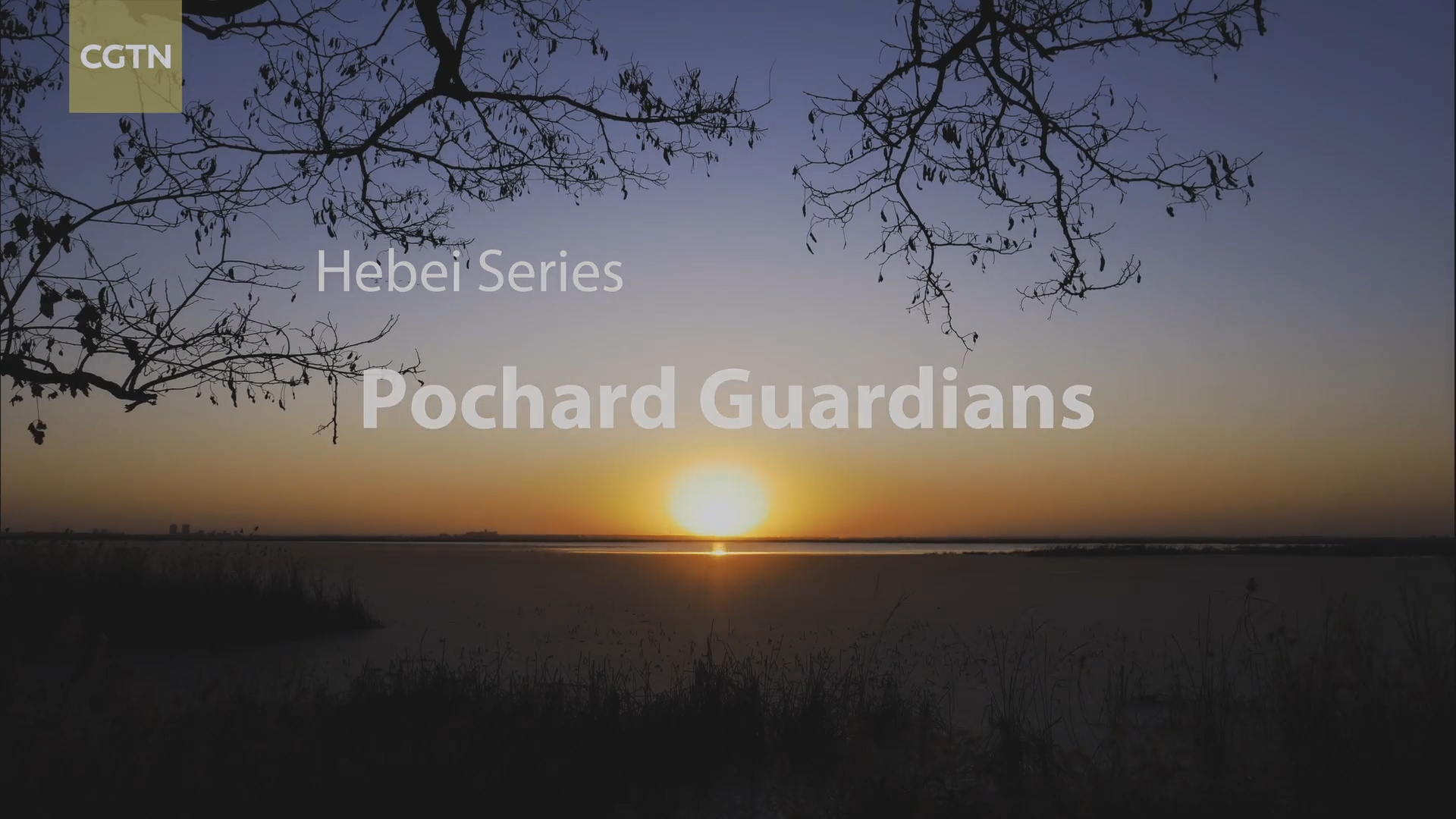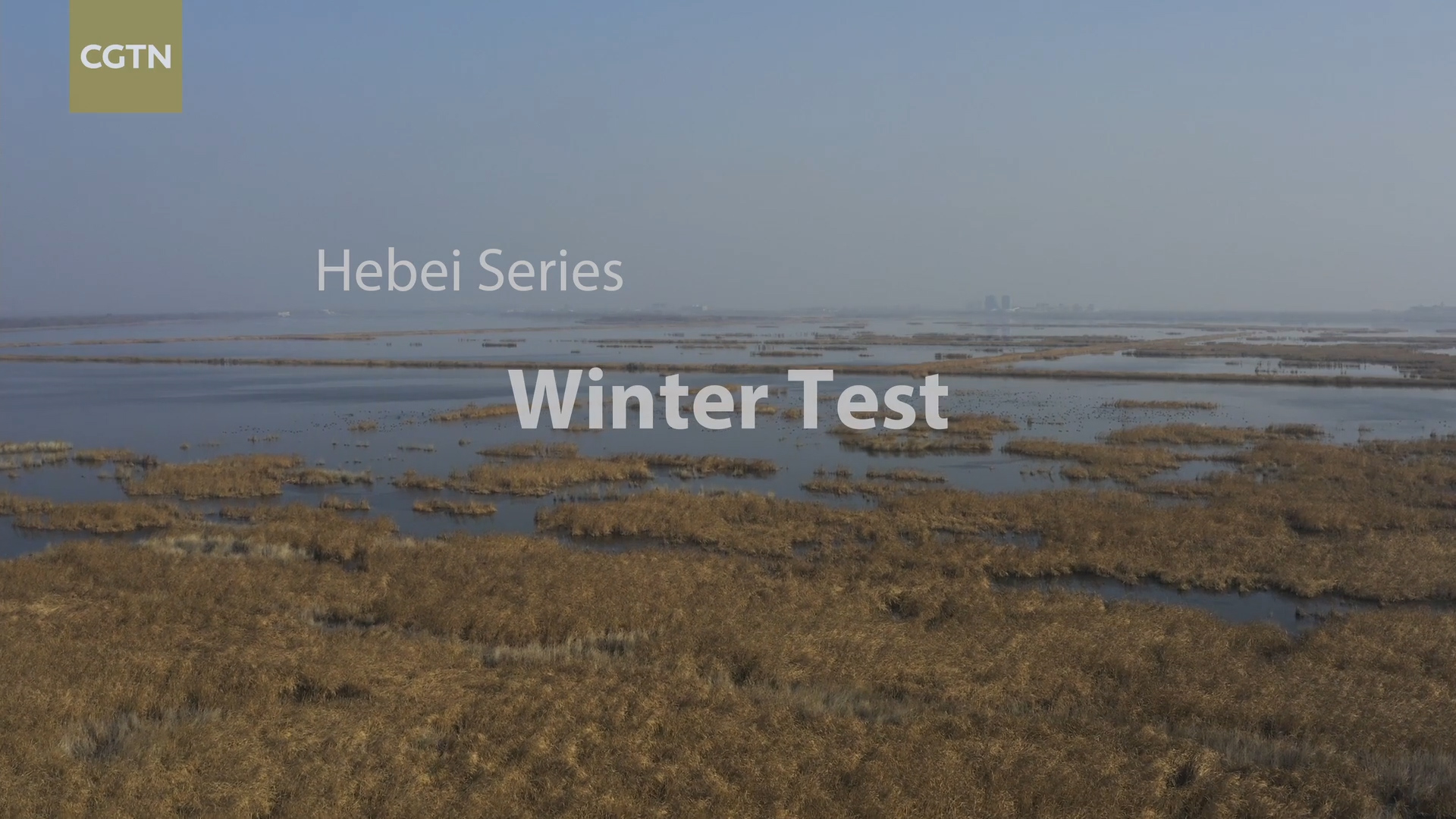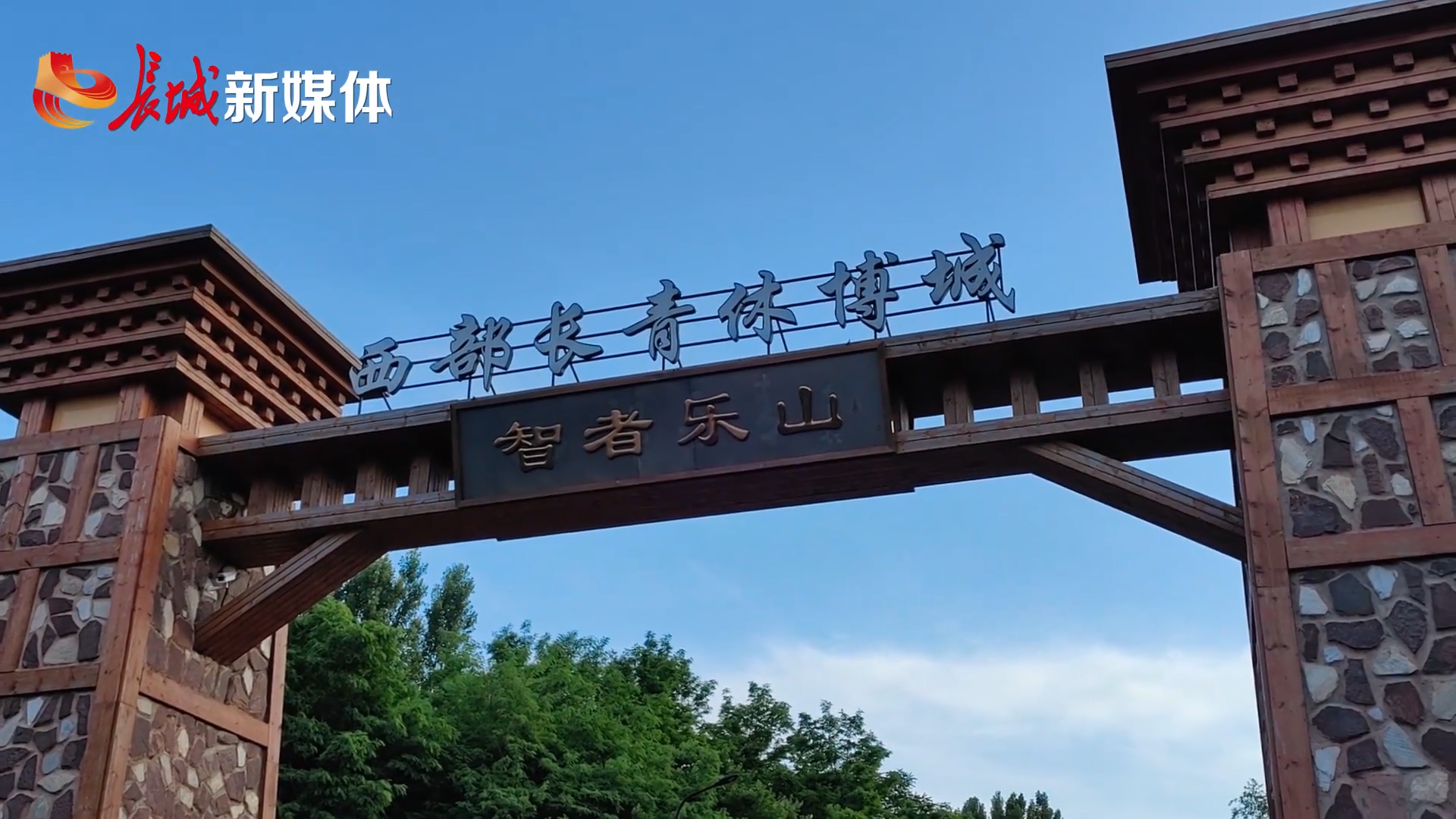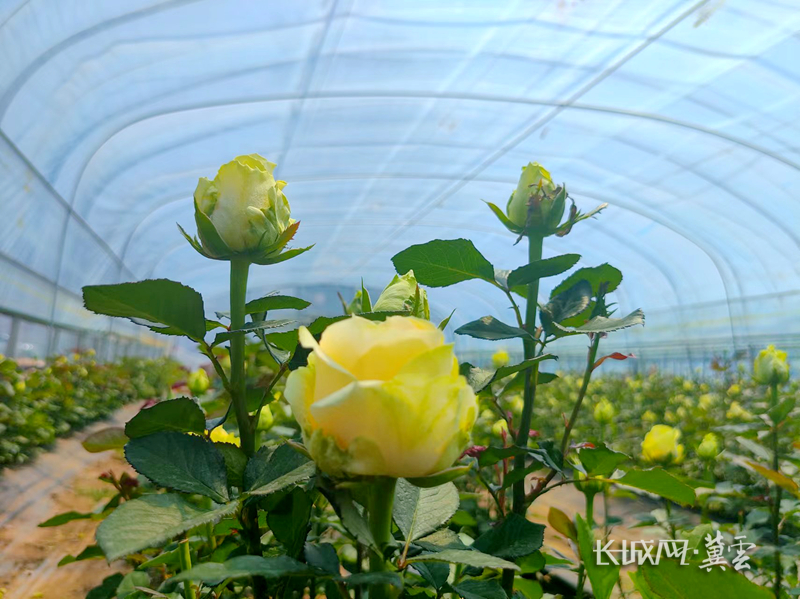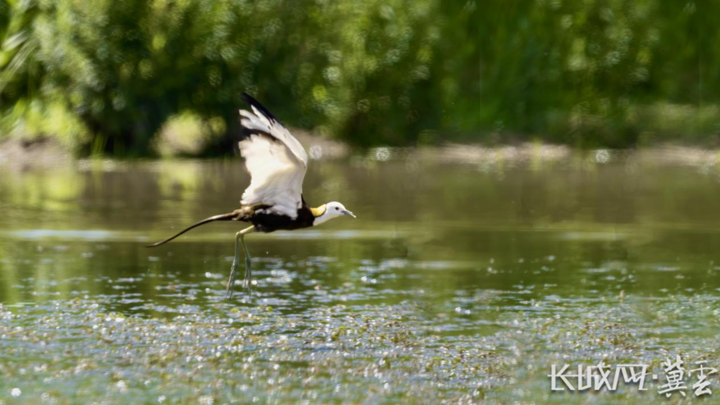八月的河北坝上草原,碧色直铺天际。似乳汁洗过的蔚蓝天空下,牧民孟帆吆喝着牛群从远处走来。
The azure green grassland in Bashang, Hebei Province, is extending direct to the skyline. Under the milky blue sky, Herdsman Meng Fan is driving his cattle herd here from afar.
现在的草原基本恢复到以前的模样了。”孟帆脚下的这片草原,曾是清朝皇家避暑狩猎之地,“小时候经常听老人讲‘棒打狍子瓢舀鱼,野鸡飞到饭锅里’的故事,那时草能有半人高。”
The grassland has now been basically restored to what it used to be. This expanse of grassland used to be a summer resort and a hunting ground for the imperial family of the Qing Dynasty. “When I was a child, I heard from old people the story about‘beating roe deer with a stick, catching fish with a ladle and wild pheasant flying to the cooking pot’, the grass at the time was waist high.”
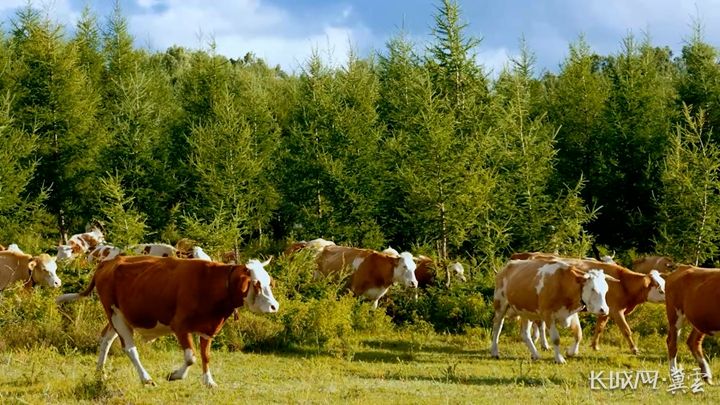
河北省承德市御道口牧场加强草原生态保护与修复,重现了“风吹草低见牛羊”的草原美景。长城网·冀云客户端记者 胡晓梅 摄
The Yudaokou Pasture near the city of Chengde has restored it to its past beauty of“cattle and sheep being revealed when wind was blowing grass low”, thanks to its eco-protection and restoration efforts. (Photo by Hu Xiaomei/Great Wall New Media)
今年62岁的孟帆从父辈开始就居住在河北省承德市御道口牧场,依靠放牧为生。十几年前,由于超载放牧等原因,部分草场开始退化,眼瞅着牛群吃不饱,为了生计,他带着60多头奶牛,跑到外地租别人的草场放牧。
The 62-year-old herdsman Meng Fan has lived in the Yudaokou Pasture from his father's generation, making a living by raising livestock. A dozen years ago, part of the pasture began to degenerate due to over-grazing. Seeing his cattle having not enough to eat, he had to rent a pasture elsewhere for his 60-odd milch cow.
2015年,听说家乡的草原通过修复焕发了生机,放牧活动又繁忙起来,他也带着畜群回到了自家草场。“草是牧民的命根子,草原回来了,好日子也就不远了!”
He did not return to his own pasture until 2015, when his hometown grassland had been restored to its original vitality and so had the herding activities. “The growth of grass concerns the livelihood of herdsmen, and the revitalization of grassland means a good life is close at hand.”
坝上群众的新生活,离不开草原好生态。沿着“国家一号风景大道”,从御道口牧场到丰宁满族自治县小北沟村大约三个小时车程,无边的草原铺展在天地间,平地和连绵的山丘上,随处可见成群的牛羊和奔驰的骏马。
A good ecology on the grassland has led to a new lease of life for people in Bashang. Along the State No. 1 Sight-seeing Road, about three-hour's drive from Yudaokou Pasture to Xiaobeigou Village of the Fengning Manchu Autonomous County, one can see flocks of cattle and sheep and galloping horses on the boundless grassland, plain areas and rolling hills.
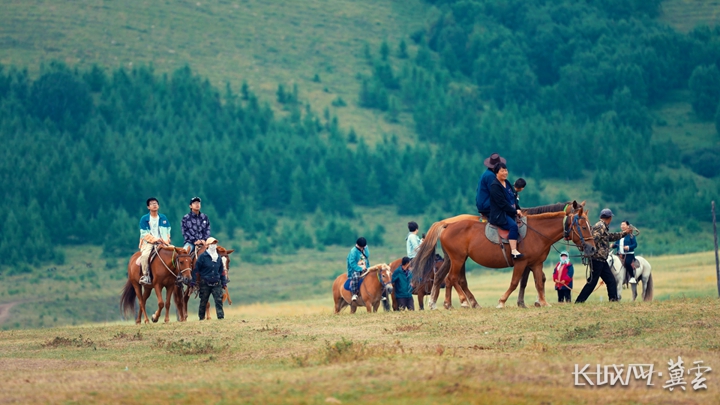
河北省承德市丰宁满族自治县小北沟村立足自身生态资源禀赋和发展优势,做足乡村旅游文章。长城网·冀云客户端记者 段维佳 摄
The Xiaobeikou Village has fully displayed its natural endowment of good eco-resources to develop rural tourism. (Photo by Duan Weijia/Great Wall New Media)
在小北沟村口,一辆辆满载游客的大巴车鱼贯驶入,村党支部书记、村委会主任于存永正忙着迎接新一批游客。“我们村山、水、林、田、湖、草、沙一样不缺,守着这么好的旅游资源,以前乡亲们却在别处讨生活,这不是捧着金碗要饭吃吗?”2000年,于存永带着在北京多年打拼攒下的积蓄返乡,开始带领父老乡亲们植树种草,修复生态,发展旅游业。如今,昔日贫穷落后的小村庄一跃成为远近闻名的富裕村。
Fully loaded tourism buses are entering the village one after another. The village Party secretary and villagers committee chairman are busying receiving guests. “Our village has no lack of hills, water, forest, crop field, lake, grass and sand. With such good tourism resources, our villagers used to go elsewhere to make a living. Isn't it a case of going begging while holding a gold rice bow in hand?” In 2000, Yu Cunyong returned to his home village with the savings from his work in Beijing. He began to lead the villagers to plant trees and grass to restore the ecology and develop tourism. Now once a poor and backward village has become a wealthy village known far and wide.
70后的刘宏宇和妻子张红玲以前也在北京打工,在于存永的召唤下回乡开起了“农家院”。张红玲告诉记者,“以前觉得生态环境跟自己没啥关系,后来才知道,那是我们农民过上好日子的底气。环境美了,游客就多,收入自然高。”
Inspired by the example of Yu Cunyong, Liu Hongyu and his wife Zhang Hongling, of the post-70s also returned to their home village to start an agritainment project. Zhang Hongling said that“she had never thought that she had anything to do with the ecology and environment. It was not until later that she realized that is a thing that leads to a good life for farmers. When the environment is getting beautiful, there would be more tourists coming and the income will naturally rise.
在于存永的带动下,越来越多外出打工的人回到家乡,建起了“农家院”,现在全村已经发展成“民宿一条街”,有“农家院”48个,床位2880余张。每到旺季,家家客满,全年接待游客不下20万人次。“我们已经先后拒绝了20多个不利于生态保护的项目。”于存永坚持,小北沟要用最清新的空气、最淳朴的景观、最良好的生态留住游客。
Encouraged by Yu Cunyong, more and more people who had been working elsewhere as hired hands have returned to the home village to engage in projects to entertain tourists. Now the village has had a“homestay street”, with 48 agrienternment houses with 2,880 beds. During brisk tourism season, the house of every family is packed with tourists. The whole village receives no less than 200,000 tourists a year. “We have rejected more than 20 projects that are unfavorable to eco-protection,” said Yu, adding that the village has committed to keeping tourists coming with the freshest air, the simplest landscape and the best ecology.

从空中俯瞰河北省张家口市塞北管理区,曲折蜿蜒的滦河水犹如丝带盘绕在绿色的草原上。长城网·冀云客户端记者 贺宏伟 摄
A bird's-eye view of the Sebei Management Area, Zhangjiakou City, Hebei Province. The Luohe River is winding on the green grassland like a silk ribbon. (Photo by He Hongwei/Great Wall New Media)
一个个返乡的家庭,见证了坝上草原的新生。“张承坝上地区既是京津冀多条河流的发源地,又是北部风沙南侵的必经之路。”河北省林业和草原局草原管理处处长李连树介绍,张承坝上地区草原面积2055.7万亩,占河北全省草原面积的70.4%。可由于历史原因,长期过度垦荒、放牧,曾经让坝上草原出现不同程度的沙化、盐碱化和退化。
Families that have returned to their home village have witnessed the rebirth of the Bashang Grassland, which is the source of many rivers in Beijing, Tianjin and Hebei and also the inevitable pathway for northern sandstorms to move down south. Li Lianshu, head of the grassland management section of the Hebei Provincial Forestry and Grassland Bureau, said that the Zhangjiakou-Chengde area boasts 1,503,800 hectares of grassland, 70.4 percent of the total grassland area of the province. But, due to historical reasons, the prolonged over land reclamation and overgrazing, the grassland had been desertified, alkalinized and degraded to a certain extent.
“近些年,牧民的生态保护意识明显增强,主动减少牲畜量,封育草场,越来越多的人愿意为绿水青山出一份力。”和坝上草原打了20多年交道的中国农业大学副教授黄顶对此感触颇深。2001年,刚考上硕士研究生的他来到张家口市沽源县,协助导师从事草地植被方面的研究,后来又到塞北管理区继续研究草地植被修复,被称为“坝上草原的守护者”。
“In recent years, the herdsmen have heightened their awareness of ecological protection and more and more people offer to contribute their shares to keeping the hills green and rivers blue by taking the imitative to reduce the number of livestock and seal up grassland for regeneration.
All these have touched Associate Professor Huang Ding of the China University of Agrosciences, who has worked on the grassland for more than 20 years. He came to Guyuan County of the city of Zhangjakou in 2001, when he was just admitted as a postgraduate to assist his tutor in the research of grassland vegetation and later, he went on to Saibei to study grassland vegetation repairs. For this, he was called a“guardian of the Bashang Grassland”.
据黄顶介绍,他们通过夏秋放牧、冬春补饲,切根松土改良、免耕补播物种、沼液养分归还等一系列措施恢复草原生态,取得了明显成效。现在塞北管理区草原每平方米物种数由以前的5个提高到15个,牧草产量每亩增长了3倍,植被盖度由约30%提高到95%以上,植株高度由20厘米增加到50多厘米,重现了“风吹草低见牛羊”的草原美景。
Prof. Huang Ding said that he had achieved marked results in restoring grassland ecology by such measures as allowing grazing in summer and autumn and using supplementary fodder in winter and spring, cutting roots to loosen the soil for amelioration, non-tillage replanting of grass, methane gas liquid returning to the grassland. Now the number of species per square meter in the Saibei Management Area has increased from 5 to 15, with the yield of grazing grass increasing by three-fold and the vegetation cover increasing from about 30 percent to over 95 percent. The plant height has increased from 20 centimeters to more than 50 centimeters. The beautiful scene of“cattle and sheep being revealed when the wind is blowing the grass low" has reappeared.
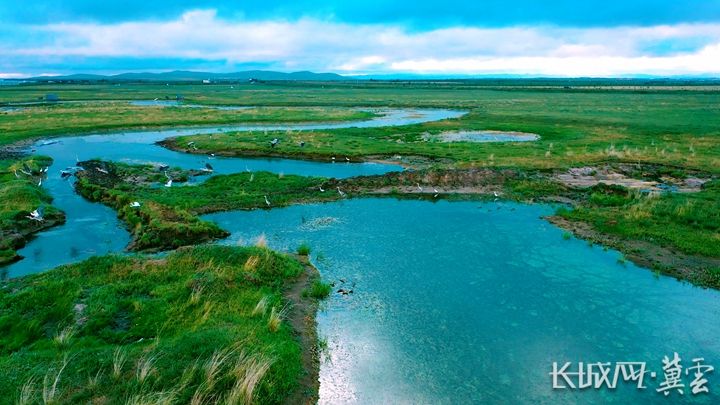
河北省张家口市塞北管理区生态环境极大改善,黄土湾国家草原自然公园已经成为大批候鸟迁徙的“补给站”。长城网·冀云客户端记者 邓光韬 摄
Thanks to the great improvement in the ecology and environment in the Saibei Management Area of the city of Zhangjiakou, the Huangtuwan National Grassland Natural Park has become a refeeding station for migrant birds. (Photo by Deng Guangtao/Great Wall New Media)
当年随草原离去的,不仅是当地农牧民,还有生活在这里的野生动植物;如今跟草原一起归来的,也不止农牧民。“现在草长得又高又密,很多曾经消失的野鸭、天鹅、狍子、狐狸等动物又出现了,野生动植物生态链越来越完整。”李连树兴奋地说。
Leaving the grassland in the past were not only local farmers and herdsmen but also wildlife that used to live there. Now returning are not only farmers and herdsmen. “As the grass is growing high and dense, many animals that used to disappear, such as wild duck, wild goose, roe deer and fox, have reappeared, making the wildlife eco-chain more and more complete,” said Li Lianshu.
Editor: Li Wenpei


